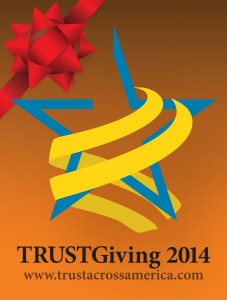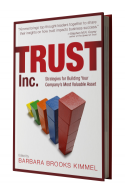Welcome to TRUSTGiving 2014, our first annual weeklong trust awareness campaign. Join the Alliance of Trustworthy Business Experts as our members help our readers navigate the complexities of trust. We will be blogging (several times a day) and posting on Twitter #TrustGiving2014.
Holly Latty- Mann has some further advice for building trust during meetings.
You may have caught an earlier post regarding opportunities to build trust at the onset of your weekly management or departmental meeting. Because people tend to remember the first and final activities of meetings, let’s now take a look at tangible ways you can end your team meetings that can promote a more meaningful trust level between and among your team members. Again the activities take on the nature of willful sharing, and as such can serve as a crude measure of your company culture within the context of interpersonal comfort and social trust.
The end-of-meeting activity is purposefully shorter and lighter than the onset checking-in activity so that even the most reserved team members feel they have a viable place to engage. With time these more reticent respondents may ultimately share at a deeper level such as the challenges of having a special needs child at home. This is when team members begin experiencing one another as real live human beings with a heartbeat. Team members invariably begin reaching out to one another in a show of support, even sharing similar experiences within their own life.
Consider the following brief activities to end your meeting. The content can either convey familial caring or offer a welcomed sense of levity. Either way, you can begin forging meaningful human connections with one another through these small, caring gestures:
►End with a quote, as most quotes impart a wisdom regarding how to enhance life and living,
►Offer meaningful information or tips such as the 4-7-8 breathing exercise to help manage stress,
► Share a brief human interest story (maybe your own), news item, or even a joke or recipe, and
►Invite other team members to share their favorite quote, tips, restaurants, and such.
The degree of team sharing carries its commensurate level of team trust. When we break momentarily from “work as usual,” we’re acknowledging the human side of one another where humor, sensitivity, and a certain sacred spirituality reside. We are acknowledging the poet, the parent, the philosopher, and adventurer in one another among many other possibilities when we share from a diversity of resources. When we engage one another on a human level that forgets titles and job roles, we are providing the kind of psychological milieu that allows the spillover of good will and trust to permeate all interpersonal relationship dynamics throughout the organization and beyond.
Holly Latty-Mann, PhD, president and owner of The Leadership Trust®, uses her two doctorates in psychology to heighten and crystallize self-awareness and emotional intelligence at root-cause level. Her holistic, integrative model extends to the team and organizational levels to embolden trust-based collaborative efforts, thereby expediting both the creation and delivery of her clients’ innovative products and services. Contact Holly and learn more through leadershiptrust.org/info@leadershiptrust.org.
Barbara Brooks Kimmel is the Executive Director of Trust Across America-Trust Around the World whose mission is to help organizations build trust. She is also the editor of the award winning TRUST INC. book series and the Executive Editor of TRUST! Magazine. In 2012 Barbara was named “One of 25 Women Changing the World” by Good Business International.









Recent Comments